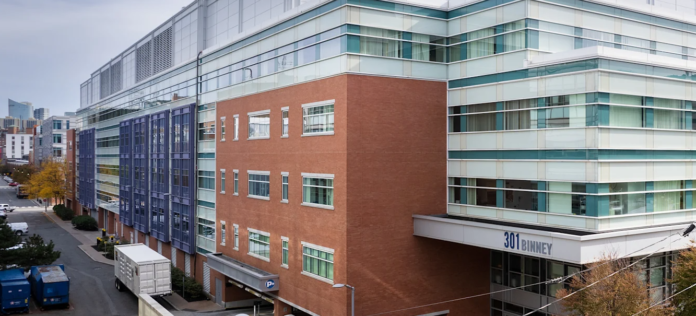CAMBRIDGE, MA— Kronos Bio Inc. is exiting its Cambridge research facility at 301 Binney Street, just months after relocating from California and weeks after announcing its acquisition by Concentra Biosciences, Boston Business Journal reported.
The move marks yet another example of the life sciences sector’s ongoing contraction in the Greater Boston area.
According to reporting by the Boston Business Journal, Kronos (Nasdaq: KRON) has agreed to terminate its lease early, paying approximately $22.5 million to landlord BioMed Realty to exit the space by June 30, 2025—more than five years ahead of the original February 2031 end date.
The biotech company leased about 40,500 square feet at the Binney Street location, which it first occupied in November 2020. The property had served as Kronos’ primary base since the company vacated its headquarters in San Mateo, California earlier this year.
The decision to give up the Cambridge site comes amid continued organizational upheaval. Kronos ceased development of its lead ovarian cancer drug, istisociclib, in late 2024, prompting widespread restructuring. By the end of that year, 83% of the workforce had been laid off, and CEO Norbert Bischofberger had departed. Deborah Knobelman, the company’s CFO and COO, stepped in as interim CEO.
In May 2025, Kronos agreed to be acquired by Concentra Biosciences, a biotech platform company backed by Tang Capital Partners, for $0.57 per share in cash. The deal includes potential milestone payments tied to cost-reduction efforts and the future of three experimental drug candidates still in development.
“The biotech said in a securities filing it would terminate the lease early for its office and laboratory space at 301 Binney St. in Cambridge,” reported Hannah Green of the Boston Business Journal. “Kronos is paying the landlord, an affiliate of BioMed Realty, about $22.5 million for the early lease termination.”
The Kronos departure adds to a growing volume of vacant lab space in Cambridge and Greater Boston, where biotech firms have been scaling back amid a tougher funding environment and rising operational costs. According to CBRE, lab vacancy in the region reached 25% in Q1 2025—a sharp contrast from near-zero vacancy levels just three years ago.
The glut of available space underscores the sobering recalibration happening across the life sciences sector. Once a symbol of unrelenting growth and investment, the industry now faces a surplus of real estate and shrinking headcounts as startups and mid-stage biotechs prioritize survival over expansion.
Kronos’ exit from Cambridge is emblematic of broader industry trends—and a reminder that even promising pipeline companies are vulnerable in today’s capital-constrained environment.


